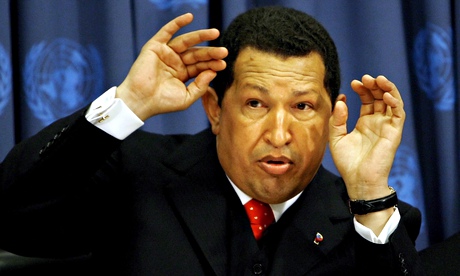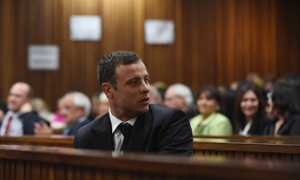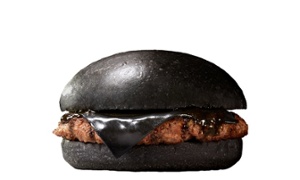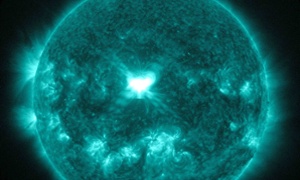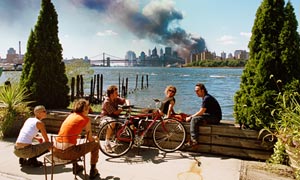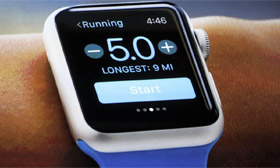Venezuela's socialist government has secured the backing of Latin America and the Caribbean to obtain a diplomatic trophy that long eluded the late Hugo Chávez: a seat on the UN security council.
The unanimous endorsement of Venezuela's candidacy to represent the region was agreed at a meeting at the UN headquarters in New York in July, say regional diplomats, who spoke on condition of anonymity because the decision had not been made public.
When Chávez last tried for a seat in 2006, the US succeeded in torpedoing his campaign. This year, Washington did not intervene.
While Venezuela must still muster a two-thirds majority in a secret ballot of 193 member states at the UN general assembly next month, the absence of a rival candidate from the region means the chances of its candidacy being derailed are slim, analysts say.
If it does win a seat, world leaders will almost certainly hear some fiery rhetoric from El Comandante's favorite daughter, Maria Gabriela Chávez, who last month was named Venezuela's alternate ambassador to the UN. Countries sit alphabetically in the council chamber, which means Venezuela would almost certainly end up next to the US, perhaps provoking some dramatic moments when the two governments clash over big issues such as the crisis in Ukraine and Syria's civil war.
The region's willingness to rally behind Venezuela troubles critics of President Nicolás Maduro and his crackdown on anti-government protests. While the US and human rights groups have accused regional leaders of being too timid in responding to the unrest, which left 42 people dead, an affinity with Maduro's anti-US stance in many parts of Latin America and his use of Venezuela's extensive oil wealth to win allies among poorer Caribbean nations mean few governments are eager to publicly take Caracas to task.
"Venezuela's tendency to side with abusive governments makes it a less than ideal candidate to help manage the many human rights tragedies the security council is facing," said Philippe Bolopion, UN director at Human Rights Watch.
Venezuela's foreign ministry declined to comment about the security council bid, or even acknowledge it was seeking a seat. One reason for the low-key approach is to avoid a repeat of the dispute that ensued the last time Venezuela sought one of the 10 non-permanent seats on the UN's most-powerful body.
In 2006, Chávez toured the world collecting promises of votes only to see support erode at the last minute after he lambasted the US at the general assembly, calling President George Bush the "devil".
Deadlocked balloting
The US then gathered support behind Guatemala. After 47 rounds of deadlocked balloting – the third-longest vote for a security council seat – both states withdrew, clearing the way for a compromise candidate, Panama, which easily won.
After that display of disunity, regional governments agreed in private to alternate representation in a certain order. Under those procedures, it is Venezuela's turn.
"But this isn't a straitjacket. The only voting rules that count are the ones outlined in the UN's charter," said Milos Alcalay, a former Venezuelan ambassador to the UN who resigned in 2004 to protest what he said was the Chávez government's violation of democratic principles.
No other country has mounted a challenge, however, and the caucus representing the 33 nations last month sent to the general assembly's president its nomination of Venezuela as the sole candidate to occupy the region's rotating seat for a two-year term beginning in January, one diplomat said.
The action reflects a decade-long shift in the region away from the US. Conservative leaders from Peru to El Salvador that in 2006 had no fear of picking a fight with Chávez have since been voted out of office. Even states that differ with Venezuela's policies, such as Chile and Colombia, want to avoid a confrontation that harkens back to the polarised politics of the cold war, when meddling by Washington was frequent.
If any last-minute opposition were to emerge, it would probably come from the US, which in July imposed a travel ban on 24 high-ranking Venezuelan officials it accuses of using excessive force and arbitrarily jailing anti-government protesters.
Heated rhetoric
But Mark Weisbrot, co-director of the Washington-based Centre for Economic and Policy Research, said the US's ability to shape the voting is minimal compared with 2006. While Venezuela's preference for heated rhetoric may stand out, Maduro's concern for national sovereignty is in step with other regional leaders, he said, so having Venezuela on the security council could serve as a counterweight to the US when debating the use of force.
"Venezuela isn't subject to pressure from the US and its allies and today, when the US is the most war-making country in the world, that's very important," he said.
Venezuela would not have veto power, so it could not affect the outcome of the 15-member council's resolutions. Still, Maduro's close ties with many countries under UN or US sanctions means the potential for clashes with other members is likely. Veto-wielding Russia would gain an ally in its frequent battles with the west.
Venezuela's government is one of the world's top buyers of Russian arms and was one of just 10 countries in the general assembly to vote against a resolution criticizing Russia's annexation of the Crimean peninsula.
Venezuela is also an ally of Iran – in 2011 the US imposed sanctions on Venezuela's state-run oil company for trading with the Islamic Republic – and Maduro also has been a steadfast supporter of the Syrian president, Bashar al-Assad. Last year, Venezuela was the only country of 47 to vote against extending a UN human rights council investigation into abuses committed during that country's civil war.
Diego Arria, who was Venezuela's ambassador the last time the country was on the security council, in 1992-93, said he feared grandstanding by the socialist government could cause problems.
"Venezuela on the security council will be a real obstacle to having a serious conversation," said Arria, who lives in New York and is urging governments to block Venezuela's election. "It will waste a lot of people's time and become like a theatre for radical groups."

